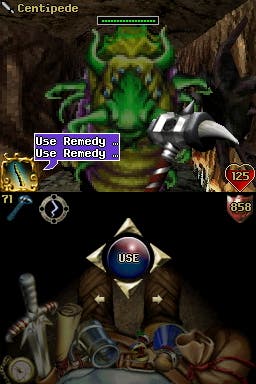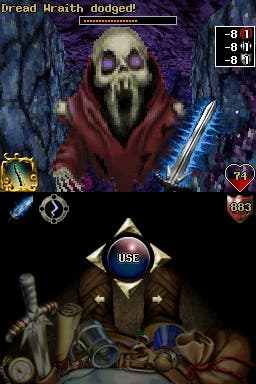Orcs & Elves
Sitting in a tree.
How is it that John Carmack is considered so cool? I mean, by us too - we think he's extremely cool. But if the world were a giant school playground, he'd be cowering by a wall, his thick-framed glasses broken above the bridge of his nose, his briefcase (he'd so be that kid) emptied out in a pile, his lunch stolen. Because he'd insist on wearing that black cape over his school blazer. This, by the way, is why videogames are great: that kid is our leader, while the bullies are left to stupidly drool through the latest Need For Speed: Look At The Boobies bought from ASDA.
And so it is that Orcs & Elves comes to exist. Back in 1986 Carmack was a legendary Dungeon Master of his own fantasy role-playing game. It's within this universe that Fountainhead's second mobile phone game is set. And now their first DS game.
A conversion of a mobile game doesn't bode well, but when produced by id, and developed by Katherine Anna King (aka Mrs. Carmack), there's reason to take more interest. Especially after the surprise decency of Doom's mobile outing. Orcs & Elves takes its cues therefrom, offering small-scaled, first-person RPG with turn-based combat.
The problem is, what would be a surprising effort for a mobile phone is somewhat disappointing on the DS. To a certain degree, Orcs & Elves offers a thick lump of nostalgia, reminiscent of pre-Wolfenstein 3D tile-based movement, and with graphics similar to those in Hexen. And when it comes to 3D worlds, graphics similar to Hexen is about as far as most have pushed the console, with the exception of the ages old Metroid DS release. Trouble is, the game can't help but show off that the DS is capable of so much more during title sequences and cut-scenes, as the camera swoops smoothly down corridors, gliding into gentle turns. Once it's in your control, you're limited to 90-degree rotations, and lunges forward and backward per tile. Clearly that's the limitations of the original mobile game, but hey, don't point out that it could be so much better.

Slightly less involved than Doom RPG, your task is to explore an ancient underground dwarven citadel (read: lots of corridors) called Zharrkarag. As you go deeper, you'll constantly teleport back to a central hub which doubles as the treasure store for an ancient dragon, from whom you can buy equipment and weaponry, or indeed exchange jewels you might find for sizeable prizes. Keep this dragon on your good side and you'll be able to barter decent deals. Piss him off, and you'll be paying full price for those extra crossbows.
Pretty much most of the game involves talking to the ghosts of dwarves, then killing everything in the level until you find the codes to open the next coloured door. With the exception of one pleasantly diverting sequence (involving pursuing a naughty rat through the back passageways of the dragon's lair), things don't become more involved than this, with distractions mostly coming in the form of 'using' every wall in the hunt for Wolfenstein 3D-style secret passageways.
You play a half-Elf, accompanied by a talking magic wand, who acts as one of the more powerful weapons on offer, and as you progress unlocks a total of four bonus spells. The wand is quite a missed opportunity, presumably intended to be the wise-cracking buddy, who instead is reduced to saying, "gory!" or similar every now and then, and providing your means of communication with the few NPCs, invariably saying quite the opposite of that which you'd ever have chosen. In fact, the entire story, while heavily written, is entirely underwhelming, and does little to disguise that this is a dungeon crawl of the most generic variety. The story, the game's site assures, is "award winning". This we can only guess was attributed to the mobile version, on the grounds that it contained one at all, thus pushing it to the number one position.

However, it's never unpleasant to play. The levels, while never exciting, are all well laid out. Secrets are intuitive and satisfying to uncover, and the environments are mixed up enough to keep things interesting. Certainly the best element of the whole thing is working out which weapon matches to which enemy type, and ensuring to switch between them appropriately. There's also a degree of tactics to be employed thanks to the turn-based approach. Certain baddies will clobber you if you get to close but are weaker further off, while others are dangerous at range, so time your moves well, and you can keep them where you want them. Or when attacked by large mobs, which happens a lot, you can sneakily micro-manage their possible movement by cunning use of corridors and corners. This keeps your attention until about halfway through, but then quickly becomes a thoughtless routine.
Played on Normal difficulty, the whole thing will be done and dusted in five hours, and will never present a hint of a challenge. Which is a poor balance. Start with Difficult, and you'll have a much better first impression, with the game forcing you to use the bag of potions you'll pick up, and be more judicious in your choice of weapons. Plus it will give you a reason to ever use the four spells the wand offers, which are all but pointless at Normal.
The double screens are used in a very obvious way. Top screen for action, bottom screen for inventory, weapons, potions and so on. There are touch-screen controls, but they're about as useless as Paris Hilton in a... with a... they're about as useless as Paris Hilton. Instead you're much better off with the buttons, using your thumbs on the screen to open the ever-useful auto-map.
Where Orcs & Elves leaves me is wanting a decent, full-length dungeon-crawling RPG for the DS. What it gives me is the first five or six hours of one that was already beginning to feel a bit repetitive. Nothing's inherently bad about it (apart from the attempt at touch-screen movement controls), but it's rarely unapparent that this belongs on your portable telephone.


